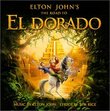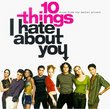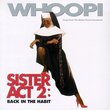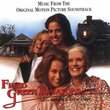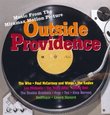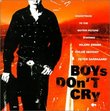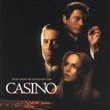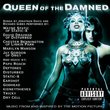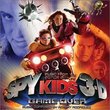| All Artists: John Williams Title: Jurassic Park III: The Original Motion Picture Soundtrack Members Wishing: 1 Total Copies: 0 Label: Decca U.S. Original Release Date: 7/18/2001 Re-Release Date: 7/10/2001 Album Type: Enhanced, Soundtrack Genres: Pop, Soundtracks Style: Vocal Pop Number of Discs: 1 SwapaCD Credits: 1 UPC: 044001432521 |
Search - John Williams :: Jurassic Park III: The Original Motion Picture Soundtrack
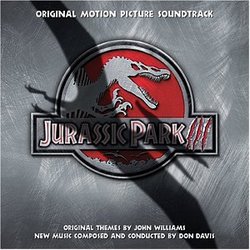 | John Williams Jurassic Park III: The Original Motion Picture Soundtrack Genres: Pop, Soundtracks
Don Davis's classical training and years as journeyman film and TV composer and orchestrator to the likes of James Horner (Titanic, Apollo 13) and Randy Newman (Toy Story, Pleasantville) paid off handsomely with the pionee... more » |
Larger Image |
CD DetailsSynopsis
Amazon.com Don Davis's classical training and years as journeyman film and TV composer and orchestrator to the likes of James Horner (Titanic, Apollo 13) and Randy Newman (Toy Story, Pleasantville) paid off handsomely with the pioneering, postmodernist-informed The Matrix, one of the 1990s' most acclaimed and adventurous film scores. Now Davis has taken on another daunting task: updating John Williams's iconic Jurassic Park themes and integrating them seamlessly into his own furiously modern take on scoring. The composer has followed director Joe Johnston's lead, matching the director's darker, more tension-wracked vision of the mega-successful dino series with an accomplished score that evokes both wonderment and terror, often (as in "Raptor Room") in the space of a few jarring bars. Davis's accomplished use of orchestral color and dynamics is a crucial element that seamlessly fuses actors and CGI-saurs, shading both with crucial emotional dimensions. And unlike all too many generic action scores, this one won't insult your intelligence as it builds to the modernist maelstrom of "Clash of Extinction" and heroic thematic resolve of "The Hat Returns"/"End Credits." Adding a welcome dose of humor, the album concludes with a typically jaunty turn by Davis patron Randy Newman on "Big Hat, No Cattle." --Jerry McCulley Similarly Requested CDs
|
CD ReviewsJP3 score ranks up there with the first two Brandon Cutro | Tyler, Texas United States | 11/15/2002 (4 out of 5 stars) "A while back on a website, there was a special feature where Don Davis was answering questions about the score and his involvement in it. I e-mailed him and he graciously responded. I asked him what his theme was in relation to Williams' theme and if the score was as big and bold as his scores for the first two. He responded by saying that he wrote a theme for the family in the film and he had some thematic material for the Spinosaurus, although this theme is derived from the Jurassic Park theme. It was his objective to match Williams' style in terms of boldness. He wrote the score Williams would have, but Davis' own musical signature was also present throughout. The music sounds very large and powerful and Williams' themes are present in several cues throughout. The music is very challenging for the musicians with fierce string writing and brass lines. Williams' tended to use the timpani for his scores, but Davis uses the snare drum for this one. Williams' themes occur most notably in "The Dinosaur Fly-By", "Brachiosaurus on the Bank", and "The Hat Returns/End Credits". Davis' themes occur throughout in several of the tracks, most notably in the "End Credits". I think Don Davis did a great job in taking over the job of a legendary film composer. It's not easy to follow in the footsteps of someone like that, but Davis did it with no trouble." You almost can't tell it isn't Williams. Chadwick H. Saxelid | Concord, CA United States | 02/17/2004 (4 out of 5 stars) "Being the first series entry not directed by Steven Spielberg, it should come as no big surprise that Jurassic Park III is also the first series entry not to be scored by John Williams. Not that you could tell all that much, composer Don Davis worked very hard to make his score sound as if Williams himself had done the honors, striving to keep the score sounding as similar to the previous entries as possible. The result is a score that at first appears a seamless continuation of Williams work, but then Davis's new themes and touches bleed through. This score is no boring retread. Recommended." No Williams, but definately something Brandon Cutro | 11/07/2002 (3 out of 5 stars) "For the last two films, John Williams has been the composer of the Jurassic park series, and I must admit that I was disappointed with the film. But to say the same for the soundtrack would be understating it. I like where the music is going, but I will state the pros and cons of this soundtrack...Pros- The soundtrack is a bit bombastic, which is something that Williams never feared and you can tell music hasn't been toned down causing a disrupt in the films mood. The soundtrack also carries very well, and for anyone who likes a loud brass section, this is your soundtrack.Cons- the score has way too much drum in it, causing it to have a much less magical feel then the first two tracks. It's hard to explain, but the drums seem to disrupt the music. And the strings section is almost completely cut out. One of the main themes of the first two scores were to create an animal like feel with the music, and that was barely existent in this film. Plus it sounds like someone trying to copy John Williams, when it should have sounded original while still keeping the same soft and sympathetic feel to the music.The music of Jurassic park is about the horror, and softness of things, and how when something looks beautiful, it doesn't mean it's not dangerous. Williams did a wonderful job at portraying this in the first two scores, but this one lacked that feel. It just try's too hard. I recommend it though, because it is still a wonderful piece of music that you will most likely enjoy."
|

 Track Listings (16) - Disc #1
Track Listings (16) - Disc #1